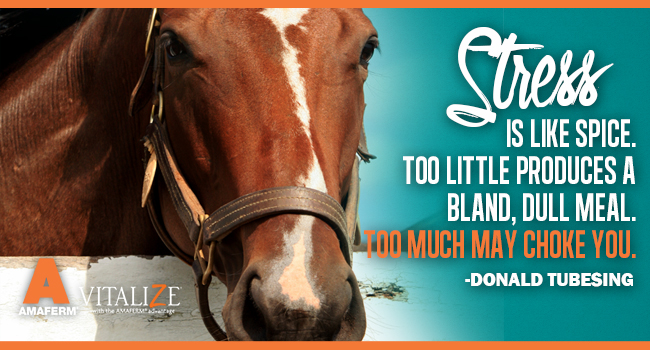Stress is any type of mental or emotional strain that results from exposure to adverse or threatening conditions. A horse’s body responds to stress through all 8 physiological systems. For example, the musculoskeletal system responds by tensing the muscles to guard against injury and pain, the respiratory system responds by increasing respiration rate, and the cardiovascular system responds by increasing heart rate and elevating blood pressure. But perhaps one of the most severe effects of stress for a horse is on the digestive system.
When a horse perceives stress (i.e. during transportation, in a thunderstorm, or at a busy competition) the body responds by diverting blood away from less vital organs such as the stomach and intestines and toward more vital organs and muscles so that the horse has the strength to fight or run away. The heart rate also increases and blood pressure and respiratory rate increase while glycogen is rapidly released into the bloodstream to support the animal’s physical reaction to the stressor. This reaction employs the sympathetic nervous systems and is commonly known as the “fight or flight” response. The body physically responds to stress to ensure that a horse has the strength and energy necessary for survival, but have some of these physiological reactions have negative repercussions.
The gut is largely neglected by the body during stress because it is not considered immediately vital for survival. Of course, this is intended to be a temporary response, but when stress becomes more prolonged, or even chronic, it can wreak havoc on the digestive system. At the most basic level, during stress blood is directed away from the digestive system and towards more vital organs. This has several effects including:
- Decreasing gastric motility and increasing colonic motility;
- Increasing gastric permeability and “leaky gut”;
- Decreasing nutrient absorption and gastrointestinal secretions;
- Decreasing metabolism and oxygenation to the gut;
- Negatively altering the intestinal microbiome (the collection of “good bugs” in the gut).
Most notably, a recent study found animals under chronic stress have 4 times less blood flow to the digestive system and may have a 20,000-fold reduction in gastric enzyme secretions compare to non-stressed animals. Because over 70% of the immune system is actually located in the gut, another result of stress is compromised immunity. Chronic stress reduces the ability of the gut to produce immunoglobulin A (IgA), a protein produced by the immune system to fight off bacteria, viruses, and toxins. This leaves the gut and other parts of the body subject to infections and colonization by pathogens.
Naturally, some horses perceive stress more often than others and may show more stress-related symptoms than other horses. While it is nearly impossible to eliminate stress, you can improve your horse’s ability to manage stress by establishing and maintaining a healthy gut using a prebiotic like Amaferm. Amaferm is found in all Vitalize products. Having a healthy gut modulates the digestive hypersensitivity that comes from exposure to stress and allows a horse to perceive stress without as many physical consequences such as a stomach ache or indigestion. This comfort alone often helps the horse learn to overcome nerve-wracking situations.


